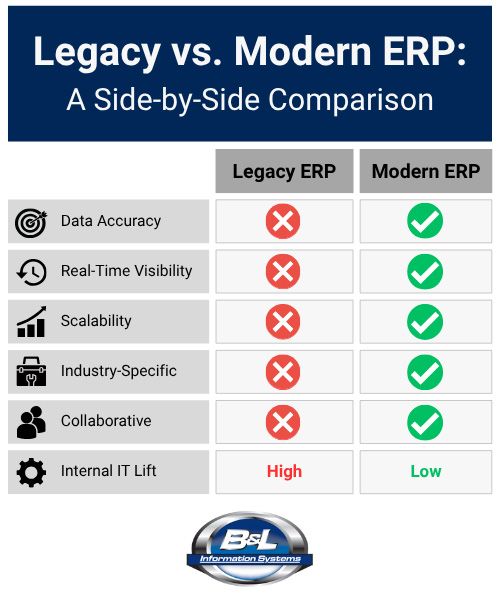Go from “Good” to “Great”: How Modern ERP is Powering the Future of Metalcasting
In the past, traditional tools like spreadsheets, generic ERP systems, and homegrown ERPs were “good” enough to manage the day-to-day operations of metalcasting facilities. However, as the industry evolves, so does the demand that is placed on technology.
Today’s manufacturing environment demands specialized, integrated, and scalable solutions that can manage the broad challenges of the industry while being tailored to the specific needs of the organization. Foundries aiming to be more competitive must move beyond outdated tools and embrace systems that empower them to operate smarter, faster, and more efficiently.
To understand why a shift is necessary, let’s explore the limitations of legacy systems and the opportunities available with modern ERP systems that are helping foundries go from “good” to truly “great.”
Limitations of Legacy Systems
From spreadsheets to generic and homegrown ERP systems, these legacy approaches often create more challenges than they solve in metalcasting operations.
- Spreadsheets have long been a staple in manufacturing for managing operations, but they are prone to costly errors from manual data entry and lack of real-time visibility. As teams grow, data becomes siloed with each user working in their own version of the spreadsheet, leading to version control issues, data inconsistencies, and poor collaboration.
- Generic ERP systems serve a broad range of industries but often lack the depth needed for foundries and metalcasters. They don’t typically support critical processes such as heat tracking, rework, material usage, scrap, flexible routing, and tooling management. Without industry-specific capabilities, generic systems can result in inefficiencies, increased costs, and reduced competitiveness.
- Homegrown ERP systems may seem like a tailored solution, but they often struggle to evolve. Maintaining a custom ERP requires dedicated IT resources, and when key personnel leave, critical knowledge can be lost. These systems also tend to run on outdated platforms, making them difficult to scale and integrate with modern technologies. This often leads to performance issues, data bottlenecks, and limited functionality.
These limitations can impede growth and innovation, making it difficult for foundries to keep pace with industry advancements.

This chart highlights how modern ERP systems outperform legacy tools across key operational areas, empowering foundries to move from “good” to truly “great.”
Benefits of Industry-Specific ERP Solutions
To overcome the limitations of legacy systems, foundries are turning to industry-specific ERP solutions that are purpose-built for the unique demands of metalcasting. As shown in the comparison chart above, modern ERP systems outperform legacy tools across every key operational area. These modern systems offer tailored features and benefits that go beyond general functionality:
- Enhanced Productivity: Automating routine tasks allows employees to focus on strategic initiatives, leading to increased efficiency
- Improved Decision-Making: Real-time data and analytics provide insights that support informed decision-making and continuous improvement
- Cost Savings: Better resource utilization and reduced waste contribute to significant cost reductions
- Better Customer Satisfaction: Consistent product quality and on-time delivery build trust and long-term customer loyalty
By aligning technology with operational needs, specialized ERP systems empower foundries to streamline processes, reduce errors, and position themselves for sustainable growth.
Embracing Cloud-Based ERP Solutions
Cloud-based ERP systems build on the advantages of industry-specific platforms by offering additional advantages that are particularly well-suited to the evolving needs of modern foundries:
- Scalability and Flexibility: Cloud solutions can easily scale with the business, accommodating growth and changing needs without significant infrastructure investments
- Accessibility: With secure, remote access to data and applications, teams can collaborate in real time from anywhere
- Reduced IT Burden: Cloud providers manage maintenance, updates, and security, allowing internal foundry teams to focus on core operations
- Disaster Recovery and Security: Built-in robust disaster recovery options and advanced security measures protect critical business data and ensure business continuity
These features enable foundries to operate more efficiently, respond swiftly to market changes, and stay resilient in a competitive industry.
Ensuring Success
Spreadsheets, generic ERP systems, or homegrown solutions may have been “good” enough in the past, but they no longer meet the demands of today’s metalcasting operations. To stay competitive, foundries must embrace systems that are purpose-built for their industry and designed for the future.
By transitioning to industry-specific, cloud-based ERP systems, foundries can enhance productivity, reduce costs, and improve customer satisfaction, ensuring long-term success in a dynamic manufacturing environment.
With the right ERP system in place, foundries can meet the demands of today and gain a competitive edge for the future. That’s how they’ll go from “good” to truly “great.”
Want to learn how Odyssey ERP can transform your metalcasting operations?
Contact us today for a demonstration.
< Back to Blog